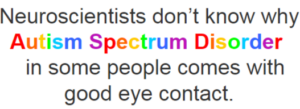Have you been told you can’t be autistic because you have good eye contact? Was your child denied an ASD diagnosis because they looked the evaluator in the eye?
I was talking to a young man at an eat-and-greet for autistic adults. He was sitting right next to me at the long table. He’d been diagnosed with autism at eight.
As we conversed, he held eye contact as well as any neurotypical had ever done with me – like, right in the eye.
I asked him if he was “cheating,” meaning, looking between my eyes. No, he said. He was looking straight at my eyeballs.
Other Autistics, too, at this meetup were (seemingly) giving me clear eye contact and each other eye contact.
Only one person out of this group of 17 noticeably avoided eye contact.
If you’ve been told that your child (or you yourself) can’t have Autism Spectrum Disorder because of the ability to maintain eye contact – it would be much in your best interest to seek a new evaluator for the assessment.
“While poorly modulated eye contact is a symptom that many individuals with level 2 and level 3 presentations exhibit (although it is not always the case), I have found that many level 1 individuals do not struggle with modulating their eye contact,” says Dr. Meghan T. Lee, clinical neuropsychologist and practice owner, Horizon Neuropsychological Services in Colorado.
“For this reason, they are overlooked by their primary care physician or pediatrician,” continues Dr. Lee.
Eye Contact: the Hallmark of Human Communication

Humans have evolved to rely significantly on eye contact – far beyond what other animal species do.
In other animals, direct, sustained eye contact is typically perceived among the species as a threat or challenge, an act of aggression.
Among people, this is also true, depending on the context. But eyes for humans hold many other kinds of information.
People are always looking at others’ eyes to see what they’re thinking or feeling.
In all honesty, this is not the main reason why I regularly engage in eye contact.
I’m autistic and, despite my “normal” execution of direct gaze, I don’t use it to figure out what the other person is thinking or feeling.
I do it so that they could figure out what I’M thinking and feeling.
A second reason is because avoidance of it would make other people have one of multiple negative assumptions about me: 1) I’ve lost interest in the interaction, 2) I’m skittish, vulnerable or submissive, 3) I lack confidence or belief in what I’m saying, or 4) I’m not being honest.
Since my ASD diagnosis I’ve interacted with numerous autistic adults and have found that an obvious avoidance of eye contact is actually the exception!
Even a 14-year-old boy (with Level 1 ASD), who spent quite a bit of time showing me his enthusiasm for video games, regularly kept landing his eyes upon mine as he spoke, switching his eyes between mine and the video games on his phone in a very natural way.
Plus, at least in my case, I’d rather look at someone’s eyes than their mouth, though when I watch people on TV, I’m often drawn to keeping a gaze between their eyes, on their nose and even their mouth (I don’t know why; my hearing is normal).
Eyes are the most interesting part of the human face when in conversation, even if I’m not actually seeking information from them. Though the mouth can also be expressive, it’s no match for the eyes.
Plus, eyes are just better looking than are mouths (chapped lips, saliva, bad teeth).
Like many autistic people, I gain most of my information about a person’s verbal messages by the words coming out of their mouth, plus how they’re speaking, tone and volume of voice, and body language.
Some people have attractive eyes, too! Why would I want to stare at their nose, lips, slimy teeth or yucky gums?
Getting Denied an Autism Diagnosis Based on Eye Contact
Because eyes are perhaps the most dynamic form of nonverbal communication, the absence of this will get a lot of attention from parents and clinicians.
When the No. 1 form of human nonverbal communication is missing – it’s a very big deal.
As a result, psychologists, neuropsychologists and psychiatrists tend to place a high premium on eye contact – when it’s absent.
Dr. Lee explains, “It is also the case that many clinicians still hold to the archaic notion that autism cannot be diagnosed if the person makes eye contact.
“For this reason, it is important for individuals to be evaluated by a psychologist or neuropsychologist who specializes in autism.
“For adults looking for an evaluation, make sure to select a provider who has experience working with adults on the spectrum, as adults have received more social training over time and have learned to mask more readily than children.”

What is masking?
Masking is when an autistic person deliberately conceals autistic traits such as the way they walk, move their arms and hands, and even the way they speak. Plus:
• Suppressing stimming behaviors when around other people, such as rocking, sucking on their knuckles, sniffing their hair, tapping their face, flicking their fingers, etc.
• Emitting facial expressions to align with the context even though they don’t feel natural, such as looking surprised or smiling.
• Engaging in verbal exchanges that don’t feel natural but are done in an attempt to appear neurotypical.
• Forcing eye contact with newly-met people, coworkers, customers at the workplace or neighbors even though it feels too personal or causes sensory overload.
It’s important to note that there are autistic people who are quite comfortable holding eye contact with the special people in their lives, but struggle with it when meeting new people or with those whom they’re not emotionally close to such as coworkers.
A highly qualified examiner for an ASD assessment knows that an adult patient, particularly a woman, may be masking during the evaluation because, in some cases, the masking has been done and honed for so long that the individual automatically goes into masking mode when around people.
Eye Contact and the Diagnosis of Autism
Autistic people, particularly those with Level 1 (minimal to zero support needs) can have good eye contact.
Eye contact is one of numerous ways that people communicate nonverbally.
So though an Autist may have good or “normal appearing” eye contact, they’ll still have deficits in other forms of nonverbal communication.
An Autist may only think they properly read a facial expression, when in fact, they got it wrong. They may also improperly interpret someone’s tone of voice.
Another example (and many autistic people will confirm this) is that they themselves get mis-read by neurotypicals.
A classic example is when an autistic person feels happy or very satisfied about something, but the neurotypicals around him don’t believe it when he insists he’s happy or glad – because it doesn’t show on his face!
The Autist’s voice, too, may not reflect what they’re feeling inside, thus throwing neurotypicals off track.
Yet all in all, these same Autists may have good eye contact.
If you’re seeking an assessment for yourself or your child, it’s recommended that you make sure that the examiner doesn’t use eye contact as a diagnostic criterion.
In fact, lack of eye contact isn’t even a diagnostic criterion as outlined in the DSM-5, the mental health specialist’s diagnostic manual.
Though this manual names abnormalities with eye contact as an example of nonverbal deficits, this doesn’t mean it’s required for a diagnosis.
 Horizon Neuropsychological Services, LLC, owned by Dr. Meghan T. Lee, conducts neuropsychological evaluations for all ages. Our doctors evaluate for many conditions including autism spectrum disorder, ADHD, anxiety, depression, OCD, psychosis and behavioral difficulties. Our doctors show how patients can build upon their strengths and work around their weaknesses to be the best version of themselves.
Horizon Neuropsychological Services, LLC, owned by Dr. Meghan T. Lee, conducts neuropsychological evaluations for all ages. Our doctors evaluate for many conditions including autism spectrum disorder, ADHD, anxiety, depression, OCD, psychosis and behavioral difficulties. Our doctors show how patients can build upon their strengths and work around their weaknesses to be the best version of themselves.
 Lorra Garrick has been covering medical and fitness topics for many years, having written thousands of articles for print magazines and websites, including as a ghostwriter. She’s also a former ACE-certified personal trainer. In 2022 she received a diagnosis of Level 1 Autism Spectrum Disorder.
Lorra Garrick has been covering medical and fitness topics for many years, having written thousands of articles for print magazines and websites, including as a ghostwriter. She’s also a former ACE-certified personal trainer. In 2022 she received a diagnosis of Level 1 Autism Spectrum Disorder.
.
Top image: Freepik.com










































